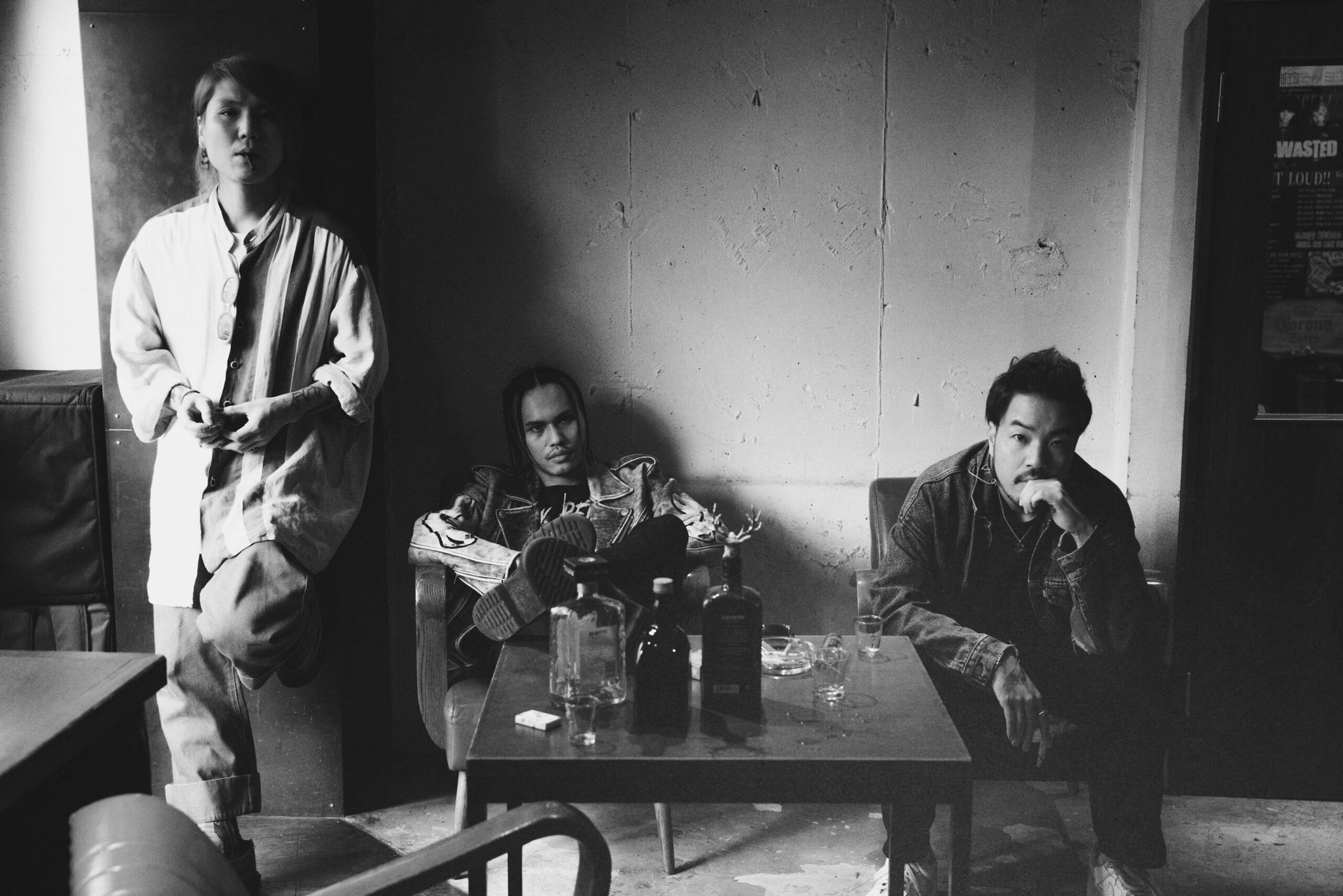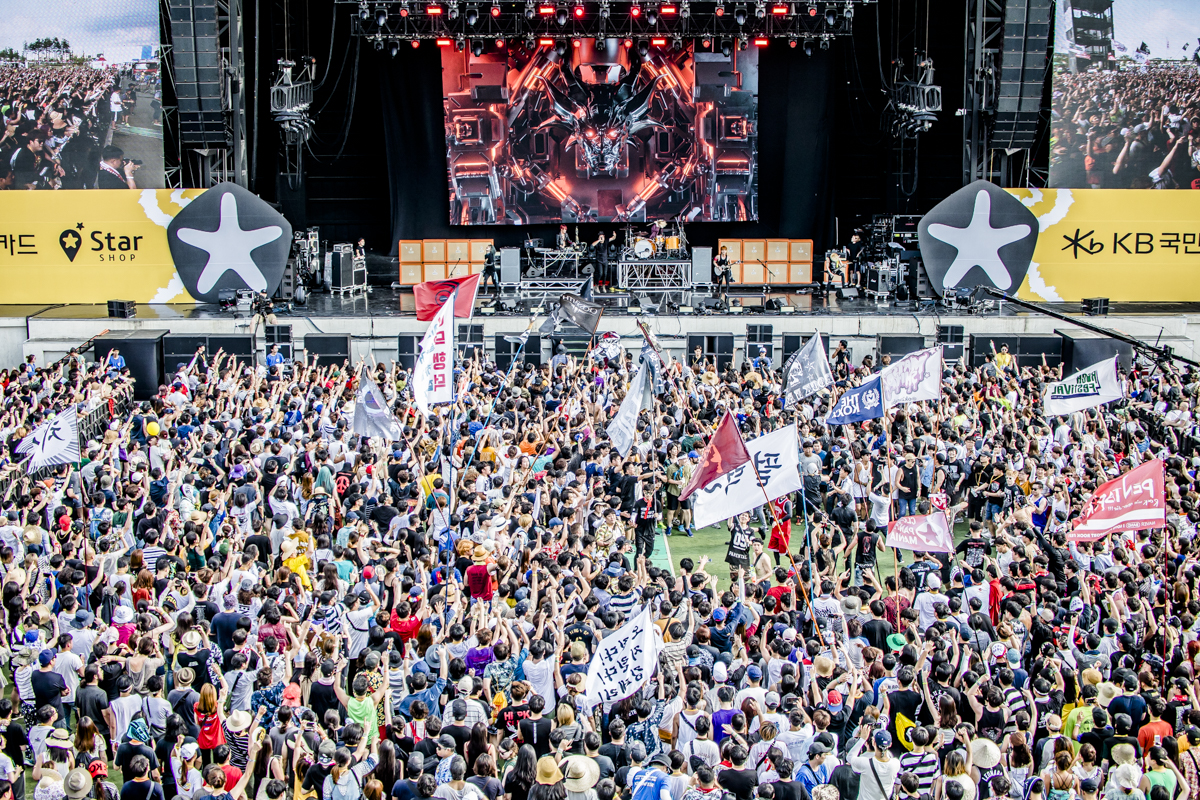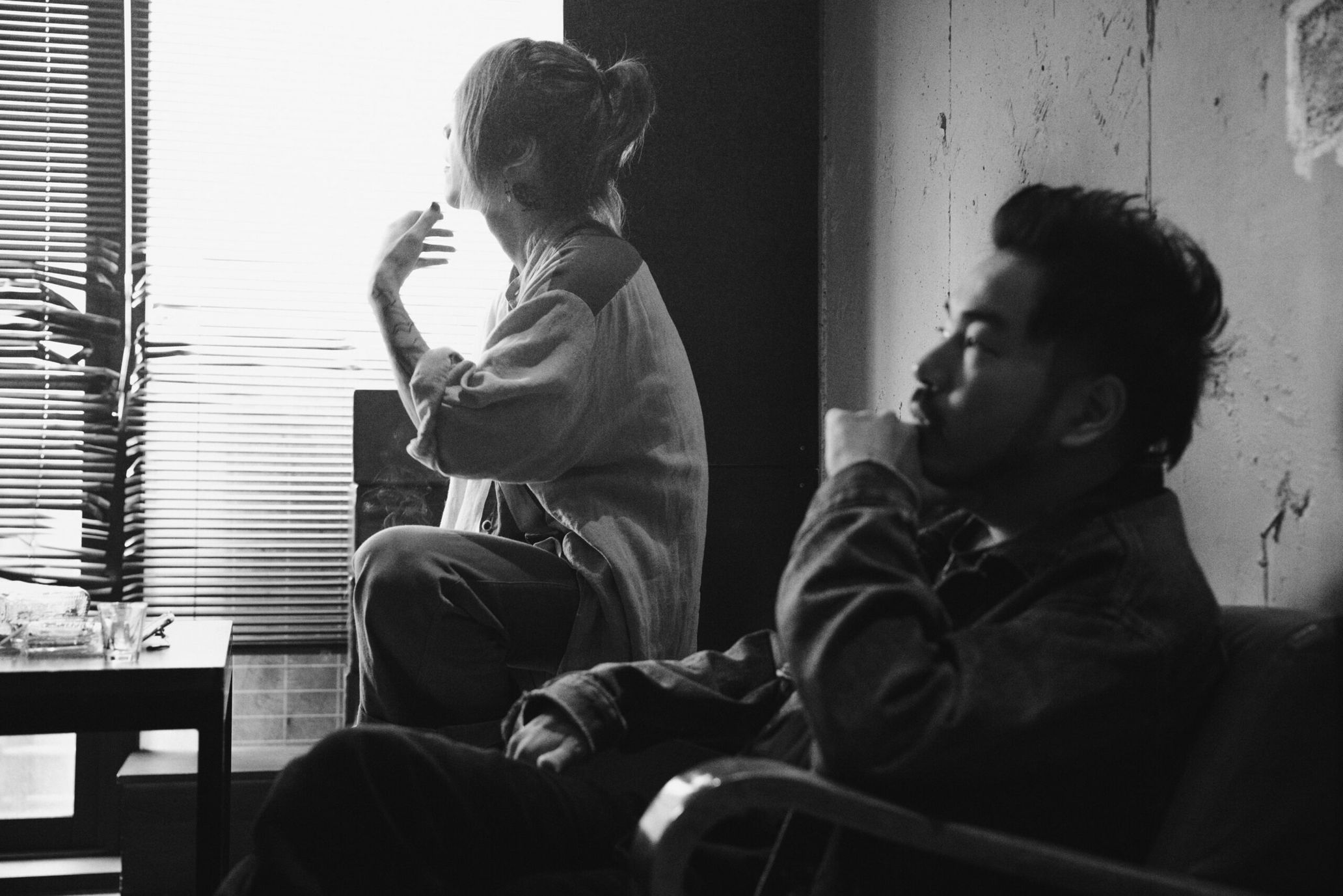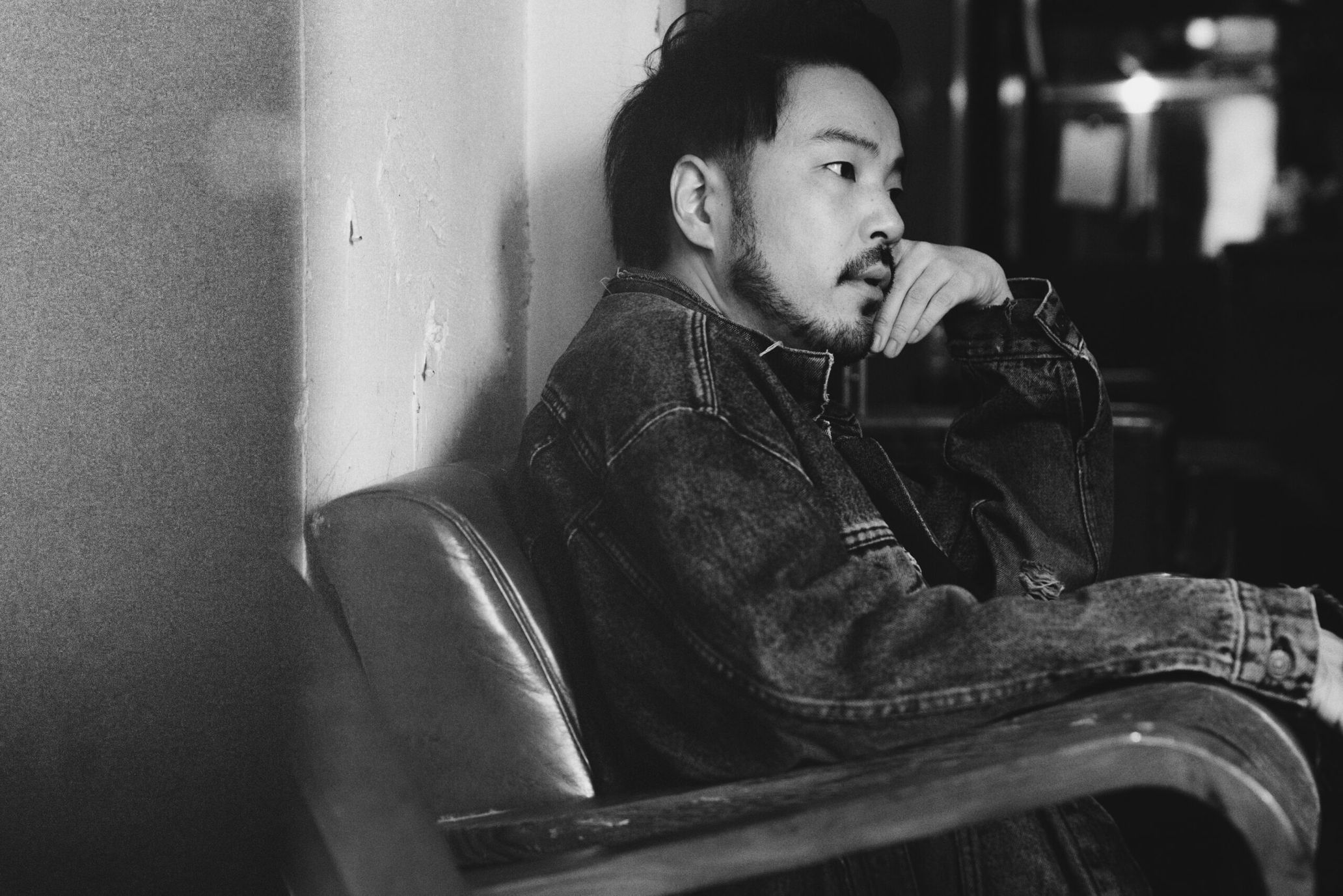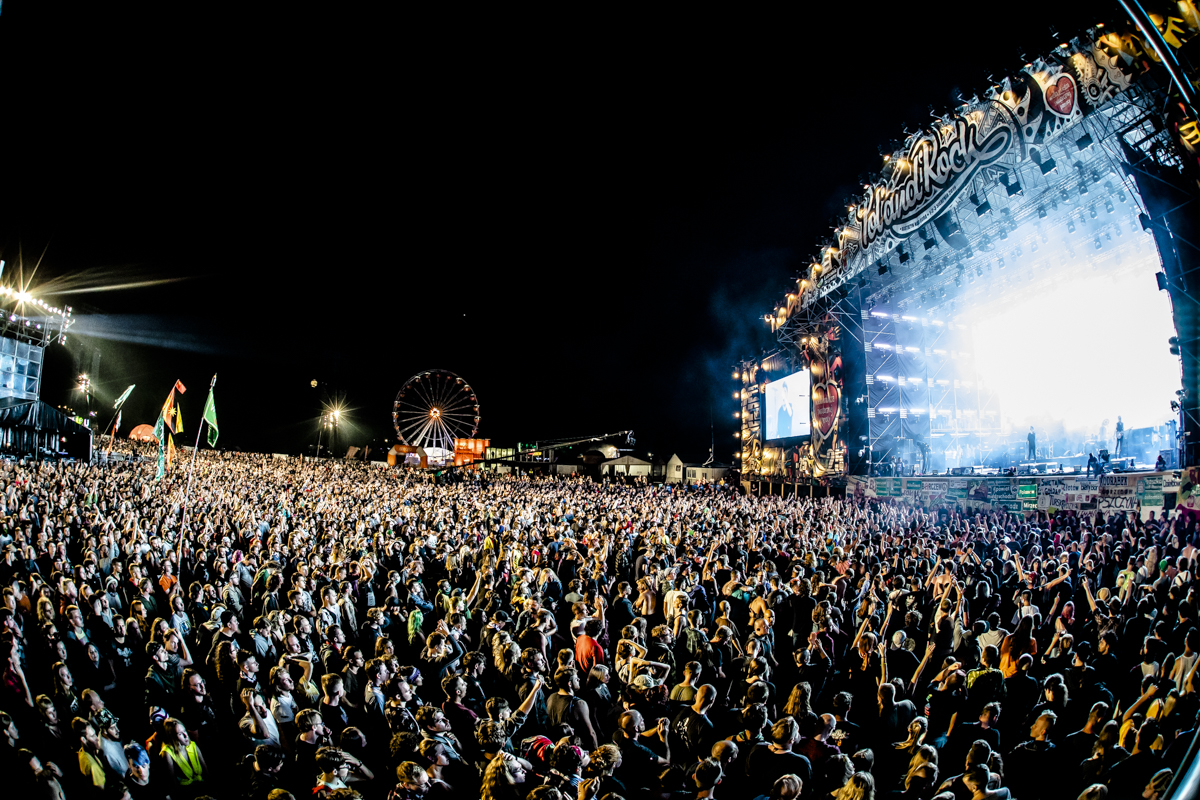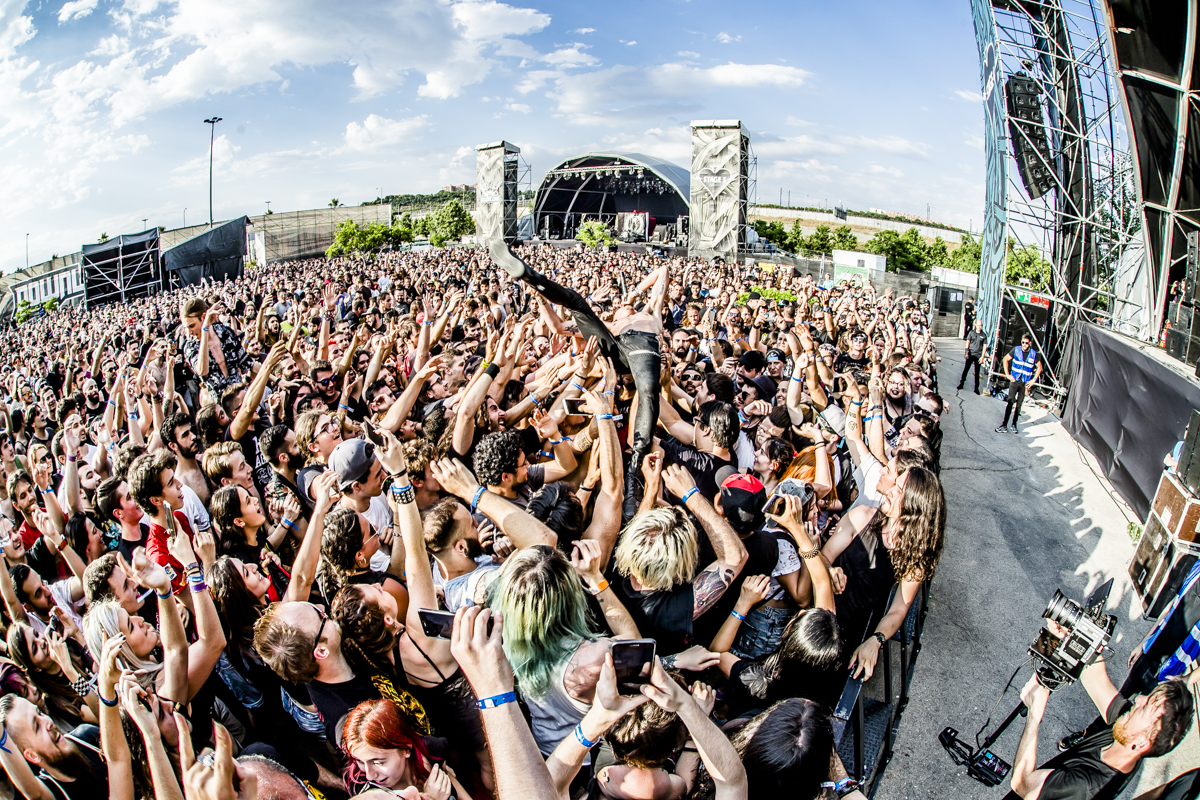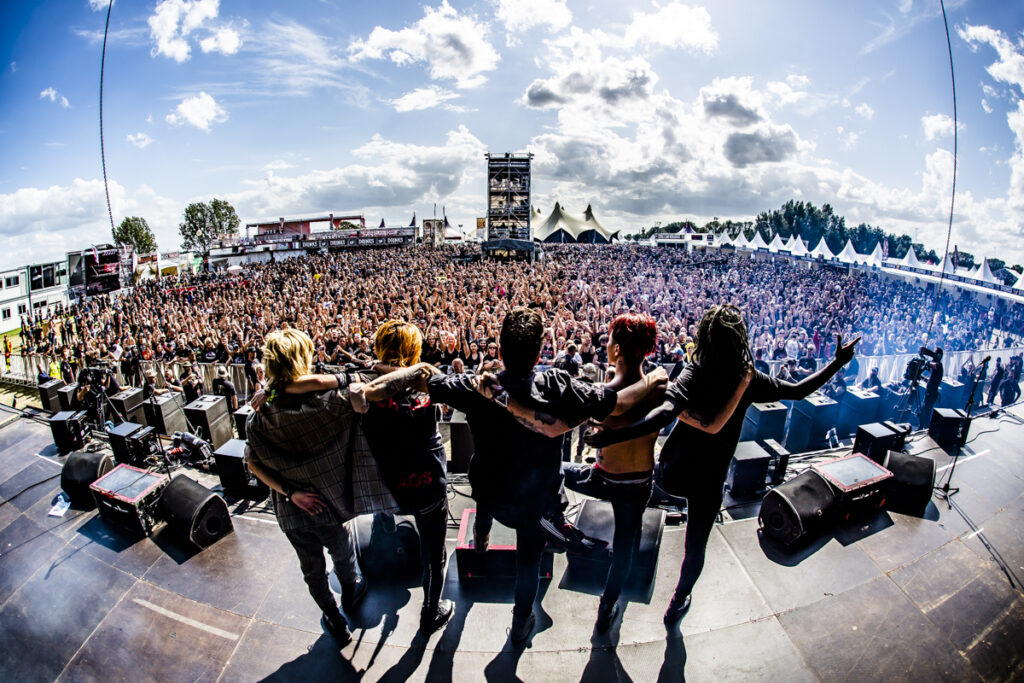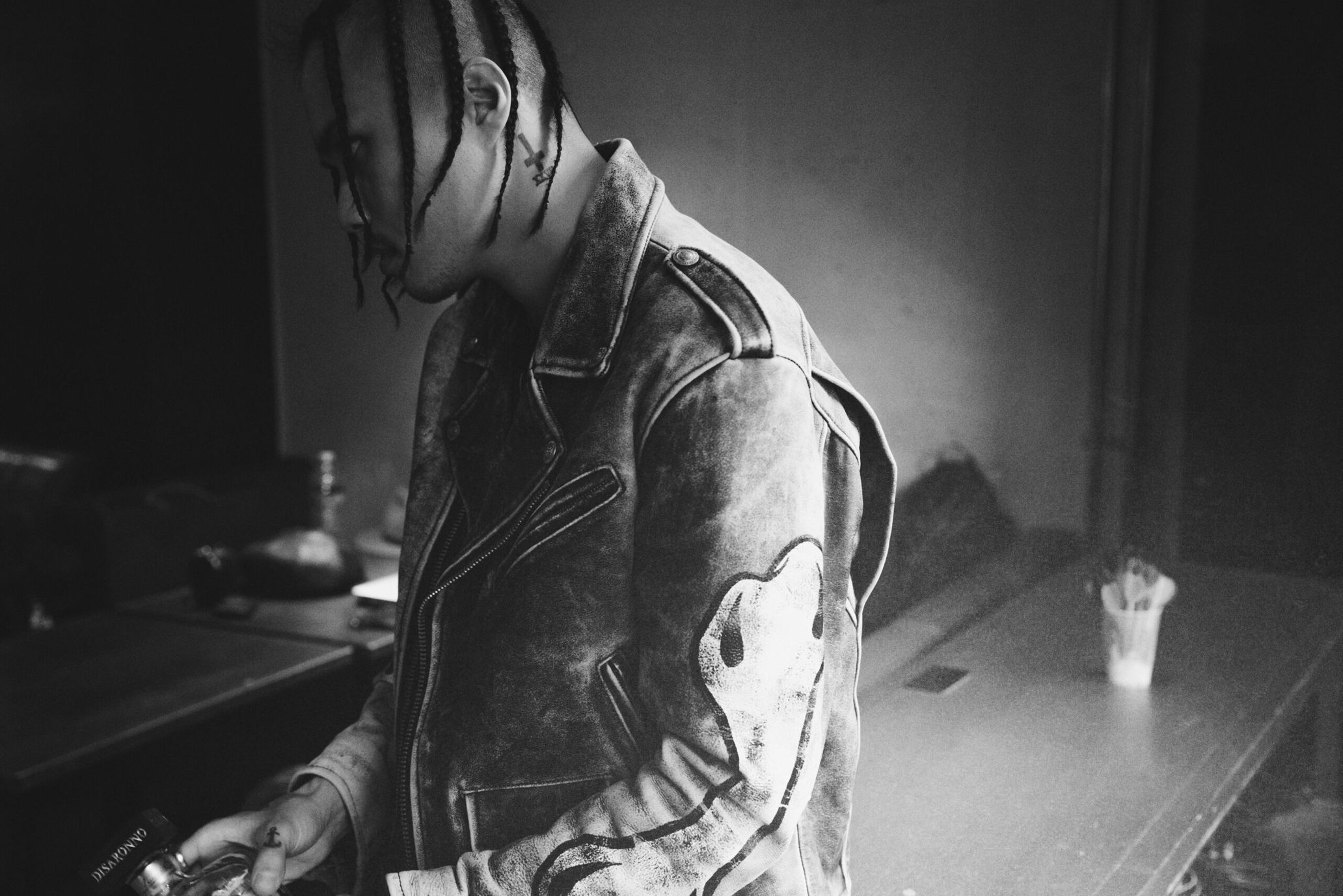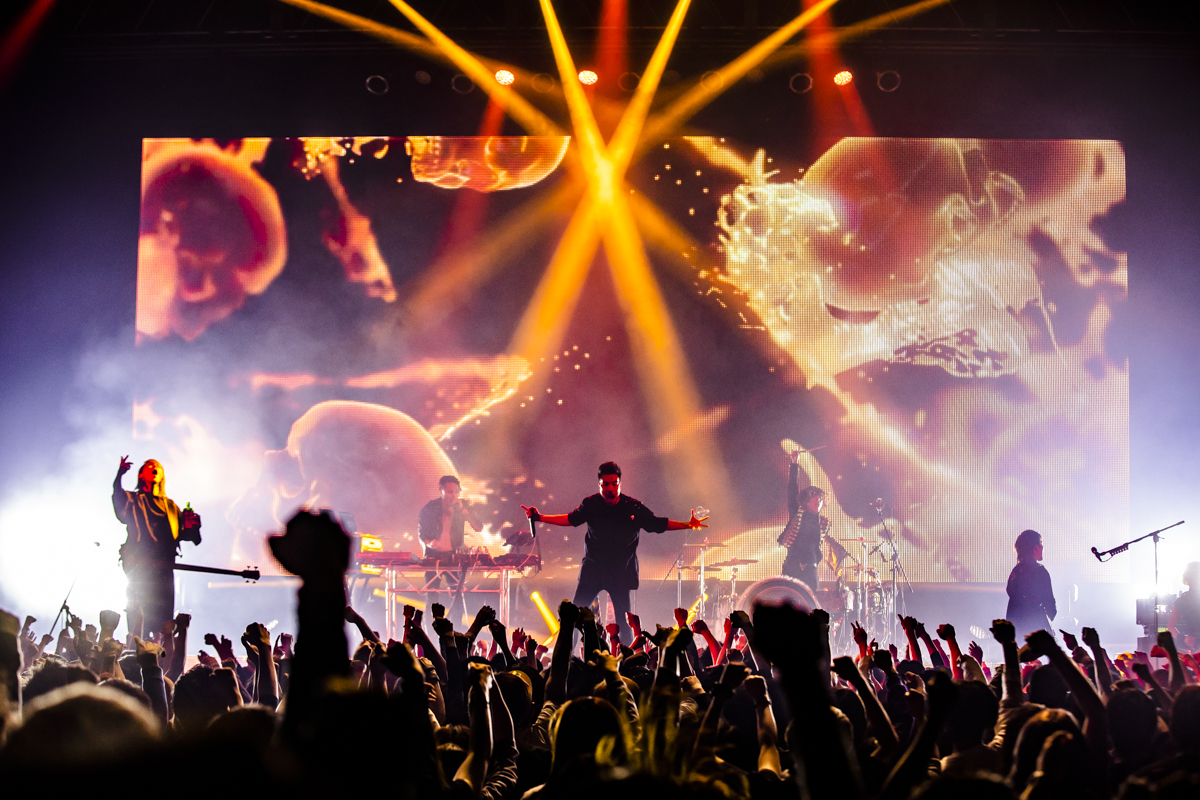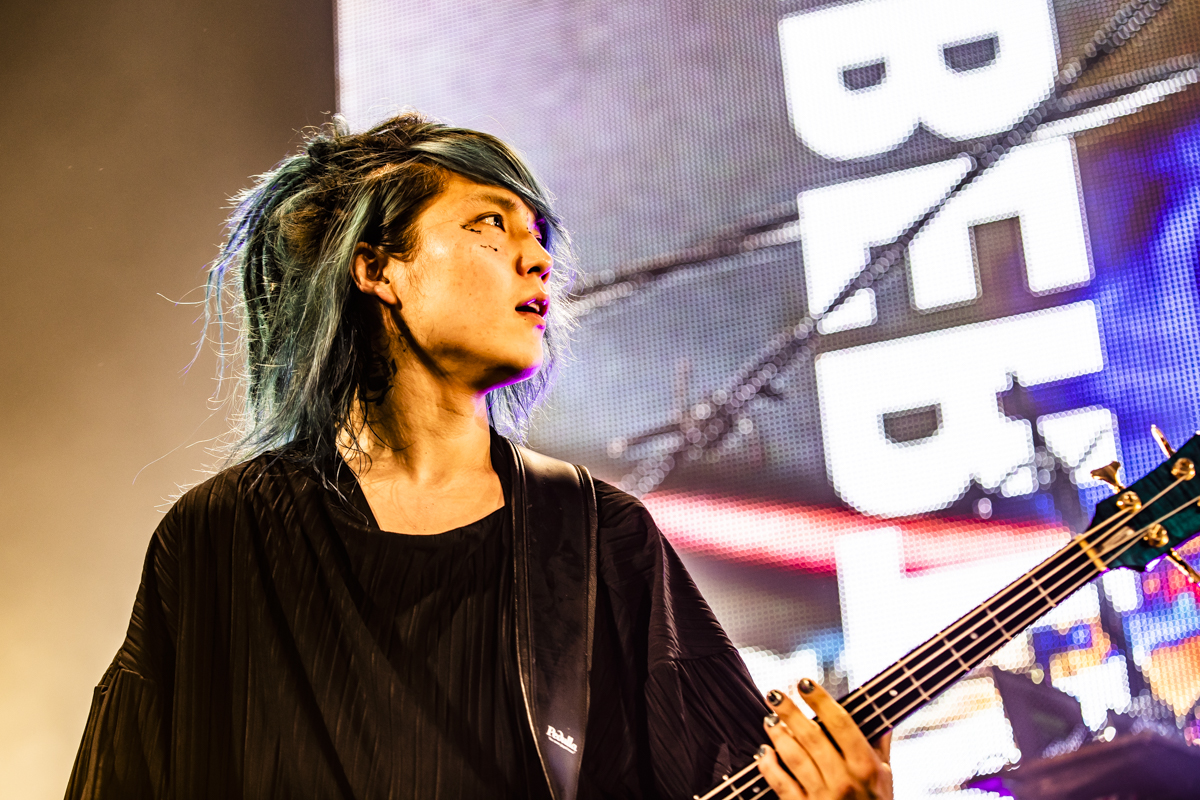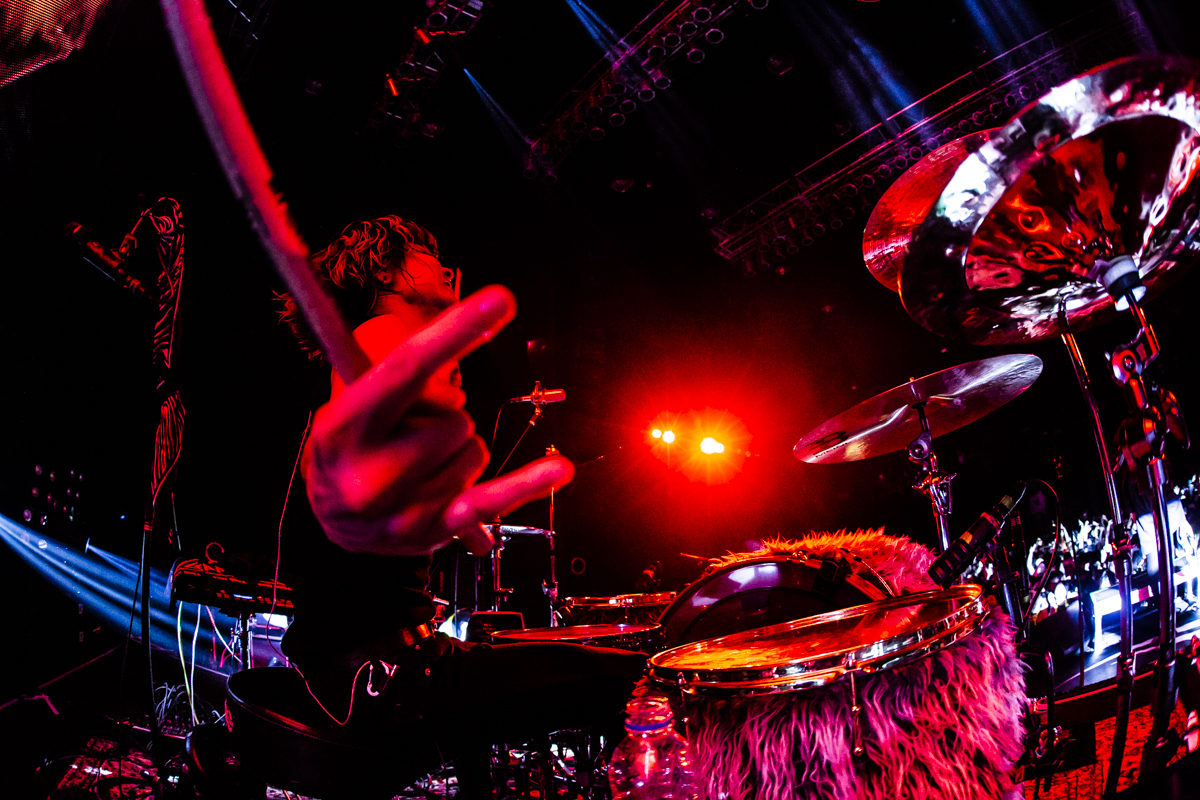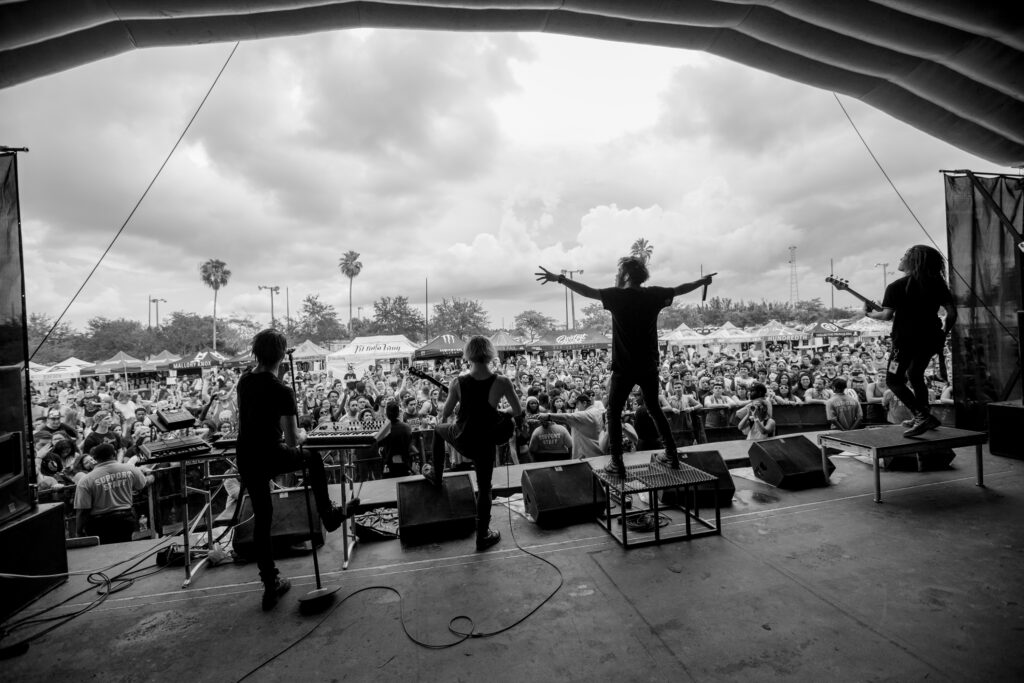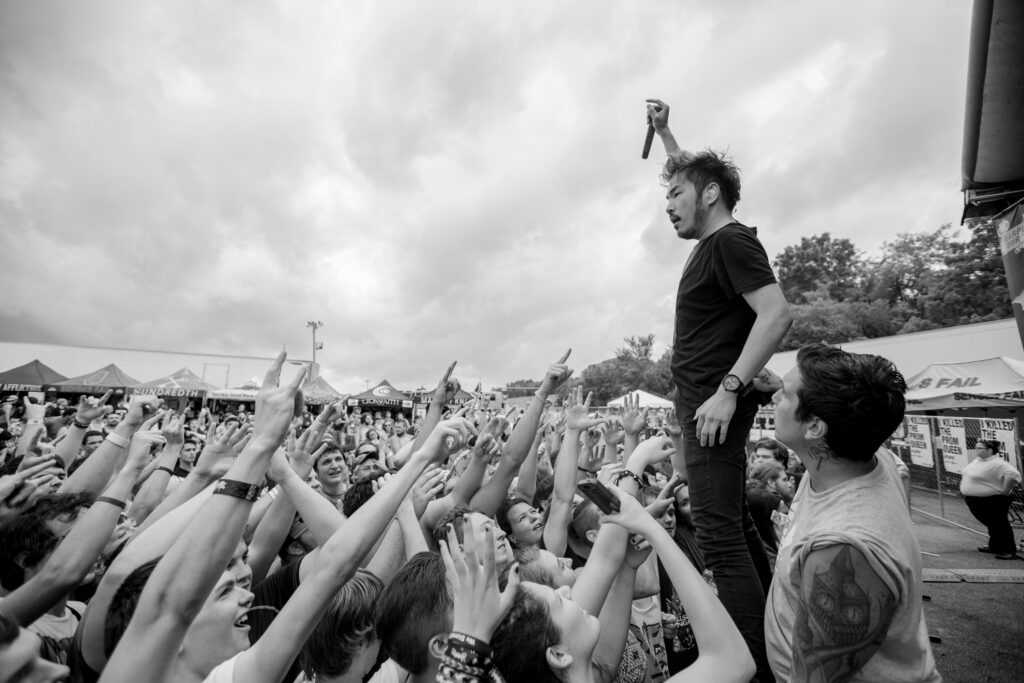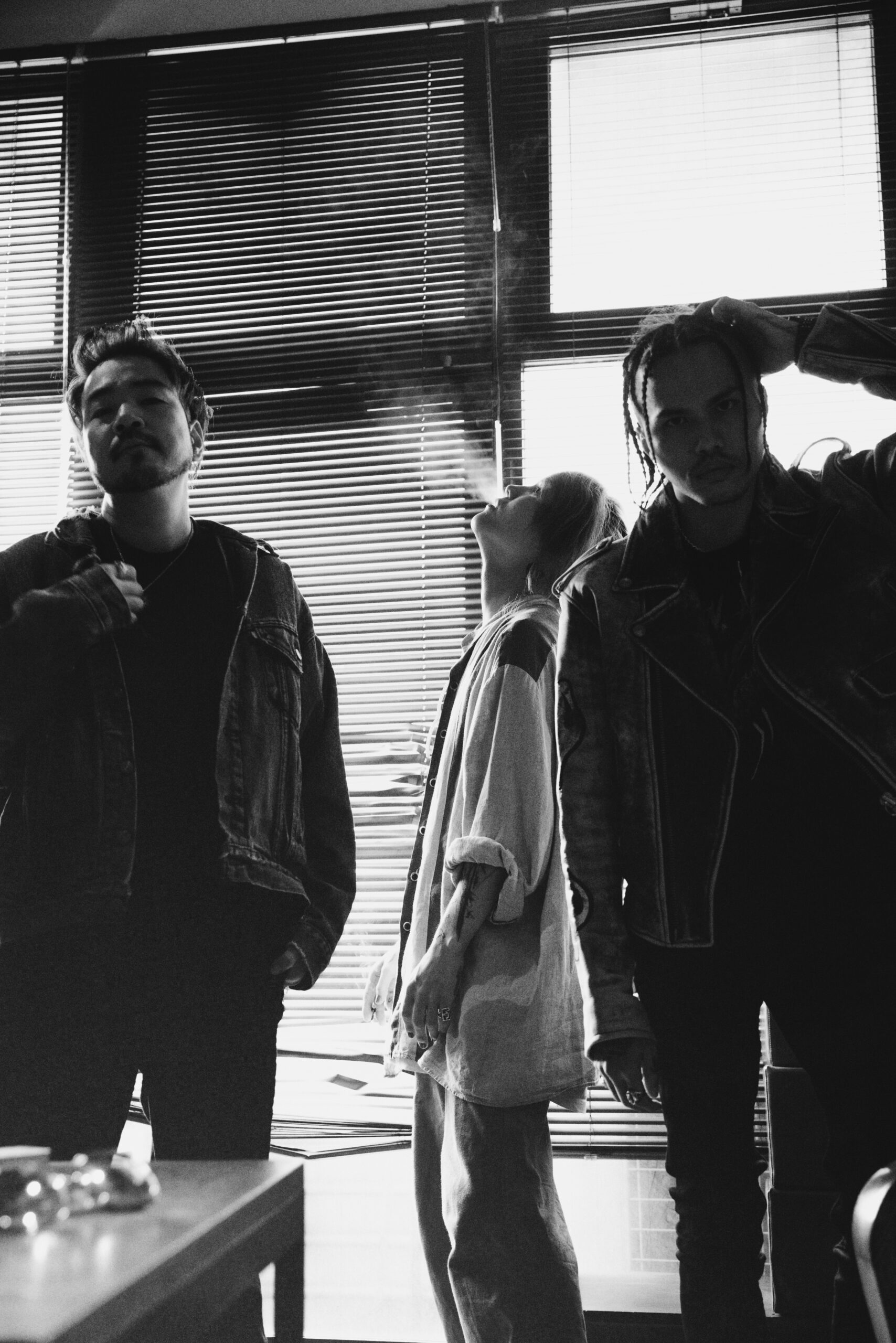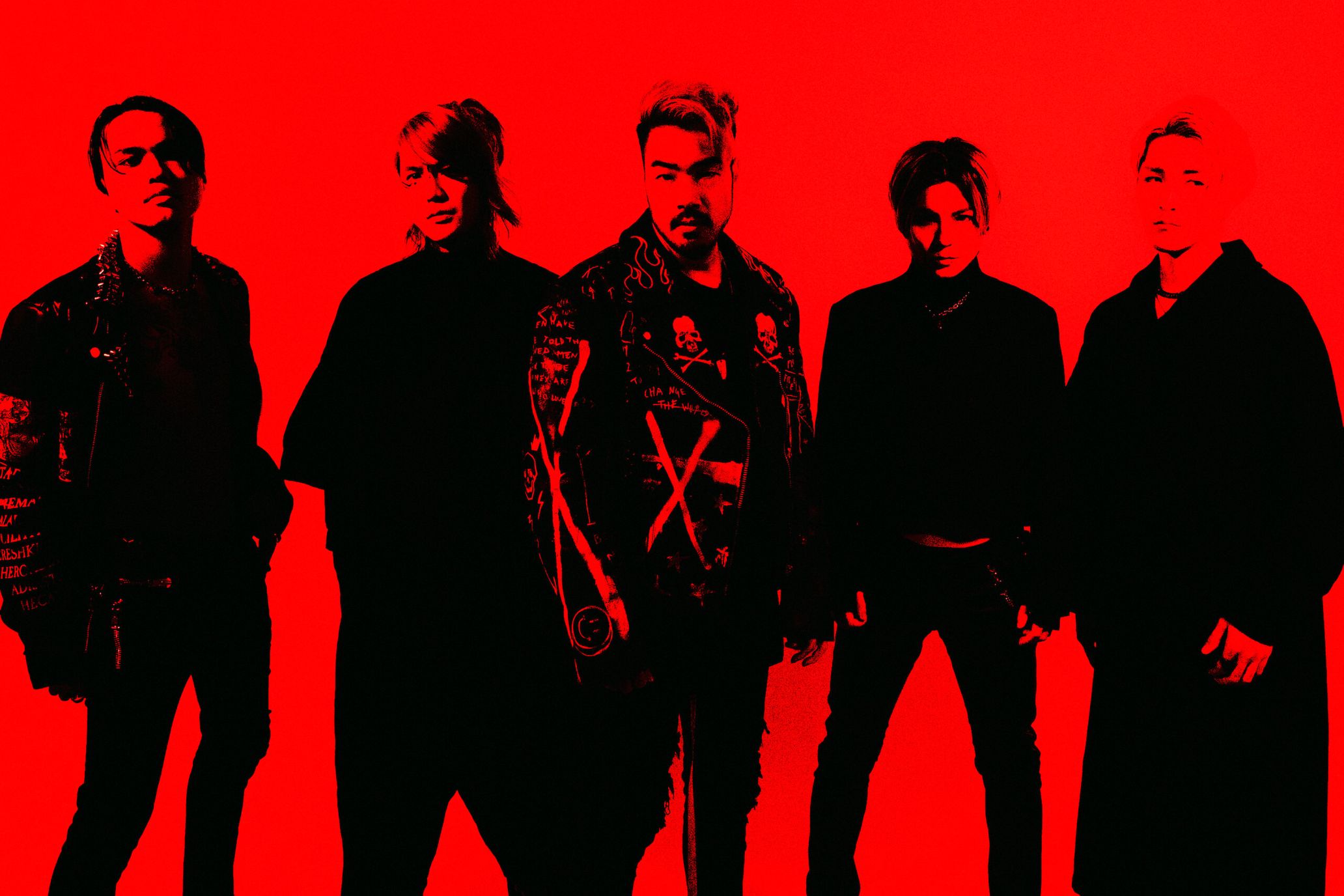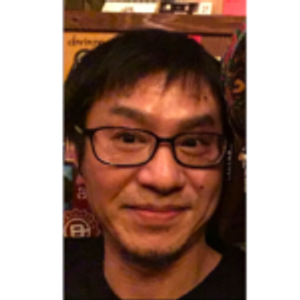Crossfaith is a metalcore band from Osaka that has been performing on the world stage. With dramatic and heavy sounds mixed up with electric sounds and strings, they have made their presence felt at the festivals abroad and on their own world tours. 2021 marks the band’s 15th anniversary. We took the opportunity to ask the band to reflect on their unique and distinct musical journey.
Crossfaith’s musicality never stop evolving as they continue to travel around the world and absorb various band sounds, the vibes from audiences, and cultures. In this interview, we asked Koie, Hiroki, and Teru about what they felt during the global pandemic, the new songs released in September and October this year, and the source of the ferocious rock spirit that makes up the band Crossfaith.
The 15-year history of the band: From its formation to a foray abroad
—— Crossfaith is celebrating its 15th anniversary this year. Have there been any major changes from when you formed the band to now?
Teru: I have more tattoos [laughs].
Hiroki: I wasn’t in the band when it started, and I joined two years later, but back then we were driving cars and selling stuff all by ourselves. But over the past 15 years, more and more people have come on board the ship called Crossfaith, and now we can leave more things to those people.
Koie: I think we’ve been able to fulfill the dreams we had when we first formed, such as touring overseas. However, I thought that after 15 years we would become incredible rock stars, but there were some big hurdles as well. Of course, we experienced some happy moments and some realities that made us want to run away. Back then, we were working like mad.
—— In 2014, you performed at the “Download Festival” in England. Wasn’t this the moment when your dream came true?
“Live performance at Download Festival (2014)
Koie: Well, you could say so. However, even though we performed, we were not the headliner on the main stage. In this sense, we didn’t reach the top. Well, I’m happy that we’re still having fun and working as a team with the same members.
—— Can you tell us about what exactly you dreamed when you formed the band?
Koie: We’ve been chasing dreams that people would say are reckless, like performing at Download Festival as headliner. But as a result, we have been performing overseas every year, and one of our dreams came true when we did our first UK tour in 2012. We had a pretty tough schedule, and we drove a van all over the UK.
Teru: Of course we have the ambition to headline Download Festival, but we already fulfilled our dream of being a band when we formed, and we still feel like we’re in that dream. However, the coronavirus pandemic has prevented us from playing shows at all, and we haven’t been able to go overseas for about two years. Recently, I even dreamed that I’m on an overseas tour.
—— When was your first show outside of Japan?
Hiroki: It was in China in 2010. It was a music festival organized by the Chinese government, and I was told that it would expected to attract about 30,000 people, but….
Koie: There were only 500 or 600 people there [laughs].
Hiroki: Yeah. On top of that, the security was far from perfect and there were local cops watching our show the whole time [laughs].
Koie: I remember that Japanese rock band Quruli was also there.
Teru: Sora Aoi was there too, right?
Hiroki: Yeah, Sora Aoi was the headliner.
Photography Cazrow Aoki
—— Crossfaith, Kururi, and Sora Aoi…… it’s quite a chaotic lineup, isn’t it?
Hiroki: Sora Aoi was very popular in China. So her performance seemed to be the most exciting time for the audience.
Teru:However, even though the audience was not as large as we had expected, the response to our show in China was quite primitive. That’s why we were excited. We had always longed for this kind of reaction because we’d seen the Prodigy‘s Warriors Dance Festival shows and Metallica‘s shows in Russia.
—— Metallica at “Monsters of Rock 1991” in Moscow. The crowd went crazy for that show!
Teru:Watching those videos, I was inspired by the energy of rock music.
Hiroki : It’s interesting when you play in places where rock music has not taken root, because you get responses that you never expected.
Teru : For example, when we toured China, we sent the promoter a list of songs we were going to play. And they said, “What’s ‘Jägerbomb’?
Koie: We got told that “bomb” sounds dangerous [laughs].
Teru : And that’s why we couldn’t play “Jägerbomb” at the show.
Hiroki: There was some kind of censorship.
Crossfaith “Jägerbomb
—— I’ve also heard stories about people checking song titles and lyrics and limiting the songs the musician can play at shows.
Koie: That’s exactly what happened to us.
Teru: In terms of overseas experiences other than China, we played a show in a very rural town in Italy. We did a show in a place where we could not believe that people would come, but once the show started, people started to gather there. This was also something I couldn’t experience in Japan.
Hiroki: There are places in Europe where parents and children come together to enjoy rock music. In Japan, people scarcely come to shows extemporarily. In this respect, I feel that the situations surrounding live shows and rock festivals in Japan are unique.
Reasons why Crossfaith keep going overseas for the live shows and its appeal
—— Before Crossfaith, I don’t think there was any Japanese band that went on overseas tours as frequent as you do now. What is the source of your motivation to keep going out to the world?
Teru: I grew up in Sakai, Osaka. When we made the first album The Artificial Theory For The Dramatic Beauty, we didn’t even know how to record it. Even so, we did it by ourselves. I had a vague dream of going abroad, and that’s when I met our current manager. He told me, “I’ll take you guys to America.” I hadn’t met him before, so I thought, “Who the hell is this guy?” But he went to the U.S. by himself to have management agencies overseas listen to our music. I was surprised by how active he was. So we decided to work together. We wanted to go overseas, and he wanted to take Japanese bands overseas. Hence, our feelings matched, and our performances outside of Japan became a reality.
—— I see. That’s how it happened.
Koie: The main reason why we keep going overseas is because it’s fun! I’m kind of addicted to it. When I meet Japanese bands that have gone abroad who say touring abroad is frightfully tiring, I feel like, “Are you serious?” Of course, there are times when it’s hard, but I’ll never forget the moment I looked up at the sky in England and thought, “Oh, I’m in England now.” When you are abroad, you get stimulated from everything around you. In a way, we have found the core of our band in the shows overseas. We haven’t been abroad for about two years now, so when we get together with the band members, we always say, “I can’t wait to go abroad!” That’s all we talk about now [laughs].
—— You miss being abroad so much, right?
Hiroki: This might sound abstract, but when we play shows overseas, sometimes we get good responses from the audience and other times we don’t. When that happens, we can go back to the zero point as a band. If we don’t get what we want from the audience, we can change the setlist for the next show and try something different, and that’s when I think we are doing a band. In terms of personal episodes, I try to walk around the city when I’m on tour. I’ve been to about 200 cities in 40 countries so far, and the music I hear and the cityscapes I see while walking around are very fresh. It’s hard to experience a sense of zero as a band if you just keep touring in Japan. We need to input fresh things overseas and output the influences we receive from them in Japan. I think this cycle is what makes Crossfaith the band that it is.
Photography Cazrow Aoki
Photography Cazrow Aoki
Photography Cazrow Aoki
—— Have you discovered anything while playing shows and touring overseas?
Koie: When I went to England, I listened to a British band on the van ride, and the sound was completely different from what I was listening to in Japan. What I realized there was that the sound that grows in a certain place becomes the music that represents the personality of that place. Until then, music from the U.S., Canada, and the U.K. all sounded the same to me, but now I can tell where the band was from. Therefore, I think Crossfaith’s music embodies some kind of Japaneseness that a part of the audience can recognize.
Hiroki: When I went to a venue in France, and there were chefs who prepared candles, wine, and bread for the audience. This would be unthinkable in a Japanese live music venue, but I realized that this is the norm at this kind of place in France. It was so new to me and reminded me of how diverse the way of enjoying music.
—— What about you, Teru?
Teru: We participated in Limp Bizkit‘s tour and saw some really cool bands at festivals overseas. We’ve been inspired by all of them, which let to band’s growth. We’ve been thinking about how we could put on a cool stage that would be as good as the ones of bands from other countries. Also, we want to bring back to Japan what we felt was rock in other countries. At our live shows in Japan, I want audience to feel that Crossfaith brings a new and different wind.
Koie:Yeah. I’m glad to meet people who say, “After seeing Crossfaith, I now want to go abroad.” I’d like to see more Japanese bands going abroad.
—— By the way, what are something you felt was rock in other countries?
Hiroki: For example, even if there’s trash left on the ground at a festival, people would think it’s okay if there’s something more important than trash at the festival. Because rock music can’t be fully described rationally, and it’s the rough-edged part of it that is so appealing.
—— That’s true. Some overseas rock festivals don’t have trash cans, and some don’t have ushers or guards. The venues of such festivals are full of people who come purely to enjoy the music. That sense of openness is probably unique to festivals outside of Japan.
Teru: I think the extent of freedom that people seek in rock music is wider at overseas festivals.
Koie: There are countries like Japan that place emphasis on cooperation, and then there are countries that don’t care about other people. They are like “It’s a festival, let’s have fun!” On the other hand, foreign artists performing at or those who come to the Fuji Rock Festival are very impressed with how beautiful it is. But we’ve always admired foreign rock bands and their culture, so we’re drawn to the rough stuff.
—— There’s no right or wrong answer to that, it’s just a matter of taste and which one you prefer.
Koie:That’s totally right.
What they have built over the past 15 years and their future prospects
—— Let’s talk about Japan now. At a show at “ONE MAN TOUR 2019-EX_MACHINA CLIMAX” hosted by Crossfaith in 2019, Koie said, “During the trip, we met coldrain, SiM and Hey-Smith.” What did you think at that time after seeing the music scene in Japan and overseas as Crossfaith?
Photography Cazrow Aoki
Koie: Yeah. They made me realized that there are cool bands in Japan that have similar sense of values to ours, and I’m grateful for the fact that we are still able to develop through friendly competition with the bands that made me think that. I respect that they stay and continue to be active in Japan as their own form of rock, and I no longer have to look at things from a dualistic perspective of domestic or international. On the other hand, I’m also afraid of being too tolerant. I always want to keep my middle finger up somewhere, and I don’t want to lose that attitude. Now I’m able to listen to a lot more kind of music than I used to, but I’m not sure if I should take that shift as growth or not.
Teru: That’s true. I have to value the essence of who I am. It’s important to be able to give the middle finger to people who are doing dumb things, and I think that’s how we’ve been able to do what we’ve wanted to do.
—— Well, was there anything that has been a turning point for you in the past 15 years?
Koie: I can’t even count the number of times I’ve had a turning point in my life, like when I went to the UK for the first time, or when I played Download Festival, or when I released the ZION EP in 2012. Personally, the first time I went to the UK was a highlight for me. I still remember so many details, it was such a shock.
Hiroki: For me, it was the summer of 2013, when we did the Warped Tour, playing about 40 shows over 60 days in the U.S. We spent two whole months in the U.S., traveling in one bus every day. Even on our day off, we had to be with the band members. No matter how tired we were, we had shows and parties almost every day. I realized that that’s what band’s touring is all about. But looking back from now, that tour was fun.
Photography Sammy Roenfeldt
Teru: The feeling I get from the situation in front of me changes from moment to moment. When we played Download Festival, of course I was happy, but when I got off the stage, there was a part of me that was calm and thought, “If I keep going like this, I’ll never be able to be a headliner.
Koie: The venue was filled to the brim, but at the same time we realized the limits of our power at the time. We’ve been to a lot of rock festivals overseas, so we want to rock everyone out someday.
I personally felt that Teru had changed so much when we were working on the first album. At that time, we did all by ourselves from mixing to producing, which placed him under a lot of pressure.
Teru: I was really going to sell about 12 million copies, which is as great sales as of Linkin Park‘s “HYBRID THEORY”.
Koie: Yeah. At the time of the final mastering, he said, “I haven’t finished the mix yet. I’m not sure if I’ll make it in time.” But after overcoming that challenge, Teru became much more responsible. In retrospect, releasing the first album was a turning point for me as well.
—— I’d like address your new songs, “Slave of Chaos” released in September, and “Feel Alive” released in October. When were the both songs written?
Crossfaith Slave of Chaos
Koie: I wrote Feel Alive first. It was written around the end of March last year.
Teru: Both of these songs were written during the coronavirus pandemic, so they became two contrasting songs. For Feel Alive, I wanted to write a song that could be completed with the audience’s participation. So I would like to play this song in front of the audience even under regulation relating to the coronavirus pandemic. Even though the Corona disaster has made the world a more difficult place, I still believed in the power of people and wanted to make a song that could resonate with everyone. Slave of Chaos was an impulsive expression of my frustration.
—— In the intro of Slave of Chaos, Koie tried rapping, didn’t he?
Koie: I was trying to fit my vocals in the trap beat that Teru made. It was born from absorbing various types of flows, and I was conscious of both stillness and movement in my vocals. I’m glad if listeners can see it as my new approach.
—— In addition to being a new challenge, it was a very cool song with a heavy tone typical of Crossfaith. On the other hand, I felt that Feel Alive was a song that came from the many struggles that you have experienced. I think this song also has a new texture.
Teru: We asked Josh, one of the members of British dubstep band called Modestep, to mix it. We’ve been trying to fuse band and electro sounds since the beginning of the band, so I wanted him to do it because he is at the forefront of the drum ‘n’ bass scene in the UK. With this song, we’ve successfully expanded our possibilities. Koie’s vocals have a more human touch than his vocals in other songs.
—— I see what you mean. Koie’s voice and lyrics have never been gentle as in this song.
Koie: As a vocalist, I had been thinking a lot about how to express what’s on my heart. With more things that I could do, I think I could express myself living in the year 2021.
—— The lyrics are in English, but the content is very direct, which reminds me of the ones of Japanese old-school punk bands.
Koie: Hahaha. If you translate them into Japanese, yes. Teru told me that he wanted to make a song that everyone could unite through, so I wrote the lyrics with that in mind.
Teru: Because we play the songs ourselves, it works on our bodies as well. I want Feel Alive to resonate with the audience, and it will be more meaningful for us if we play it in the live show.
Hiroki: We have a lot of aggressive songs, but this song and its lyrics are healing us. I think we were able to make this song because we had a period of time where we couldn’t play live as a band.
—— I was also impressed by the warm lyrics: “Now we find can’t live alone.”
Koie: Wearing face masks and taking a social distance has divided everyone in a sense. Many different kind of people come to our shows, but I think everyone gathers together because there is a feeling that unites everyone together. That’s why we feel a sense of emptiness when we can’t do that anymore. I am sure that everyone would echo what I am feeling. Tomorrow will definitely come, the rain will stop, and you are not alone. I would be happy if we could convey this message to you, the listeners, through this song.
Crossfaith
Crossfaith is a metalcore band formed in Osaka in 2006. The band consists of five members: Koie (vocals), Kazuki (guitar), Hiroki (bass), Tatsuya (drums), and Teru (vision programming). They have been actively performing live in Japan and overseas, and are currently on tour for their 15th anniversary in 2021.
http://crossfaith.jp/
Instagram: @crossfaithjapan
YouTube: CrossfaithOfficial
Photography Takaki Iwata

